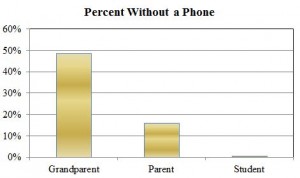How has the world changed over the last few decades?
Last week I gave two lectures on GDP, which measures the amount a country produces. One key point of the lectures is that inflation-adjusted GDP per person was almost stagnant from the Roman Empire until the American Revolutionary War. Then, starting around 1800, GDP per person soared. In simple terms, rising GDP per person means the average person has far more things than the previous generation.
I first saw this GDP graph years ago when I was a graduate student. Back then I didn’t really understand how dramatic the change in people’s lives was over the past decades. Then I talked to my relatives. Many of them told me stories of how little they had growing up. Looking around I could see how much they had now.
I asked my students during the lecture to do the same thing I had done years earlier. Talk to a grandparent and parent and ask them how much they had growing up. To make the matter simple I had the students ask their grandparent and parent two questions. The first was “how many pairs of footwear (shoes, boots, sandals, etc.) they owned when they were about 20 years old.” The second question asked “how many people shared their phone when they were about 20 years old?” I told the students to mark down 999 if their grandparent or parent did not have a phone.
Slightly more than half did the assignment. The graph of the footwear question, shown below, reveals tremendous growth in the average number of pairs owned. The typical grandparent who was twenty years old in the 1920s owned just 1 pair. Grandparents in the 1930s owned 2 pair. By the 1970s people owned 5 pair. My students report that they own an average (mean) of 18 pairs and a median of 15 pairs. This is quite a remarkable change over time!
The results from the phone question were more surprising. Asking how many people shared a phone line was not a good question, since almost half of all grandparents didn’t even have a phone! About 15% of all parents didn’t have a phone. The graph below shows that universal access to a phone is clearly a very modern phenomena.
 We currently have far more food, clothing, housing, phones and transportation today than past generations ever had. This leaves me pondering the harder question. Do all these things make us happier? What do you think?
We currently have far more food, clothing, housing, phones and transportation today than past generations ever had. This leaves me pondering the harder question. Do all these things make us happier? What do you think?
